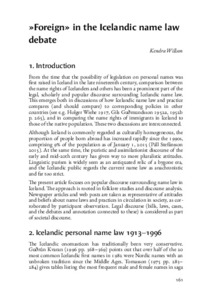Foreign in the Icelandic name law debate
Kendra Willson
https://urn.fi/URN:NBN:fi-fe2021042717009
Tiivistelmä
Discussion of name law in Iceland often compares the name rights of foreigners
and those of Icelanders, both contrasting Icelandic laws with
those of other countries and considering the name rights of immigrants
to Iceland and of Icelanders living abroad. The policy which, from 1952
until 1996, required foreign-born persons seeking Icelandic citizenship to
have Icelandic names stemmed from a puristic tradition based in the nationalistic
movement of the 19th and 20th centuries, as well as reflecting
the assimilationist policies toward ethnic others that were widespread in
Europe in the mid-20th century. The elimination of the name change requirement
was framed as a matter of human rights and connected with a
general shift toward pluralism and multiculturalism. However, inasmuch
as the revised name law granted .special. name rights to naturalized citizens
and the children of foreign-born parents, it created a new inequality.
This was connected in the popular discourse to the existing inequalities in
name law concerning fixed surnames. Fixed surnames were regarded at
the start of the the 20th century as .un-Icelandic. .parasitic culture.
and a threat to the traditional patronymic system. The name law of 1925
banned new surnames but .grandfathered. in existing fixed surnames, a
problematic decision which has led to much subsequent dissatisfaction.
Several attempts to amend the name law between 1955 and 1971 failed in
part because the issue of surnames was so controversial. Those who object
to the current name law regard immigrants' rights to keep their original
surnames and to have names that do not fulfill the general criteria of the
Icelandic name law as a form of reverse discrimination. The law is very
unpopular and the current situation unstable. Most likely the law will be
liberalized radically in the coming years.
Kokoelmat
- Rinnakkaistallenteet [29335]
